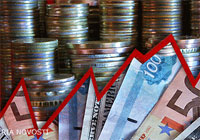Russia’s long-term budget strategy to be based on development forecast to 2030 – PM

MOSCOW. Feb 19 (Interfax) – The long-term forecast for Russia’s social and economic development in the period to 2030 will be the foundation for the country’s long-term budget strategy, as well as federal and regional programs, Prime Minister Dmitry Medvedev said.
“Long-term budget strategy, federal and regional programs should be formed on the basis of this document, but we need to have an idea of what the estimates will be for those sectors that will require additional financial resources or organizational efforts,” Medvedev said at a meeting on the country’s long-term development forecast to 2030. The meeting was held the evening before Medvedev left for a visit to Latin America.
He said assessments must be made for sectors such as energy and transport, projects related to human resources and intellectual property.
The Economic Development Ministry considered three main scenarios in drafting its long-term development forecast for Russia: conservative, innovative and target (accelerated).
All three scenarios assume moderate growth of prices for oil and other resources by an average of 1% per year, Medvedev said, adding that most analysts currently agree with this.
The forecast is based on fairly conservative assumptions regarding world prices for oil and other resource commodities. The ministry projects that the price of oil will be in the range of $90-$100 (in real 2010 U.S. dollars) in the period to 2025, after which prices might resume climbing due to deteriorating production conditions amid stronger demand from emerging markets. The oil price is expected to reach $110 per barrel ($167 in current prices) by 2030.
Medvedev said the scenario for Russia’s development to 2030 will depend on what the government accomplishes in the next five years.
“Exactly along which scenario events will develop depends on what we manage to do in the next five years, because will lay the foundation for long-term development now. Everything that we have to do is subject to the main areas of the government’s activities, which we have discussed, have held expanded meetings of the government chaired by the president, and which I have approved as our internal fundamental document,” the prime minister said.
He said that progress will hopefully be made in all areas and the government will manage to improve the system of governance and the country’s business climate.
“I hope that the structure of the economy will also change and, of course, then we will be able to resolve social and economic issues, including demographic issues,” Medvedev said.
“In any case, I consider it fundamentally important that the presented forecast provides for various dynamics for the main indicators: in places more optimistic, in others less optimistic. These indicators depend not only on the situation in the global economy, but also on the effectiveness of the pursued economic policy. This is our vision, our scenario,” Medvedev said.
He said they differ considerably from expert forecasts made in January at the World Economic Forum in Davos. “This is probably right, because they (the expert forecasts) are very pessimistic, assume that we are just floating with the current, not doing anything, or some dramatic changes take place on energy markets, on resource markets, some other very serious troubles. Therefore, our job now is to make progress in discussing the scenarios that the Economic Development Ministry has prepared and see what we should do,” Medvedev said.
He said macroeconomic indicators should not be taken as the absolutes, because “today, taking into account demographic, infrastructure and institutional constraints, quality parameters have primary importance.” This refers to increasing labor productivity, energy efficiency, improving work with human capital.
“We are all waiting for an end to the sluggish post-crisis growth so that the open window of opportunity that is much talked about today does not turn into a situation where competitive workers and technology will flow out of our country like into a black hole and large-scale capital outflows continue,” Medvedev said.
He said integration with partners and neighbors, as well as a course toward innovative development will become competitive advantages, “and not weights on our feet that will pull our economy backward.”
